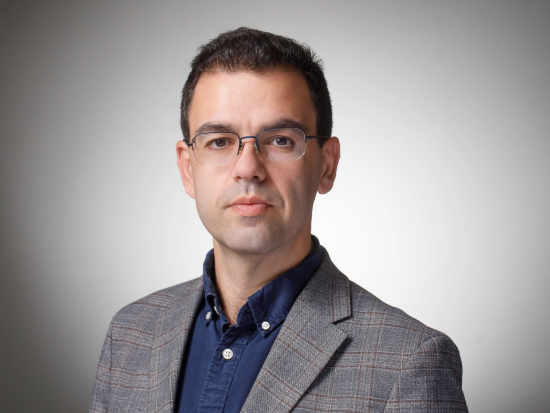 The UAB Department of Neurology welcomed Joao Pereira, Ph.D., to the faculty as an assistant professor in July 2024.
The UAB Department of Neurology welcomed Joao Pereira, Ph.D., to the faculty as an assistant professor in July 2024.
Pereira earned his undergraduate degrees in microbiology and genetics from the Faculdade de Ciências at the University of Lisbon. He later completed his doctorate at the University of Cambridge, where he focused on the epigenetic regulation of mammalian cortical development.
Pereira served as a postdoctoral researcher and instructor at Massachusetts General Hospital and Harvard Medical School, where he developed induced pluripotent stem cell (iPSC)-derived organoid models for studying Amyotrophic Lateral Sclerosis (ALS). He then transitioned to a role as Scientist II at Nereid Therapeutics, a biotech company, where he specialized in creating functional assays using iPSC-derived cells.
Following this, Yale University appointed him as the Scientific Director of the iPSC NeuroCore within the Department of Neuroscience. There, he led efforts to develop, characterize, and implement assays such as CRISPRi, neuronal outgrowth, and functional studies in iPSC-derived models of neurodegenerative diseases like Parkinson’s and Alzheimer’s. He held this position until his recruitment to UAB’s Department of Neurology and the Center for Neurodegeneration and Experimental Therapeutics (CNET).
Pereira reflects on his passion for medicine and neurodegenerative diseases, expressing excitement for his new role in the department and CNET.
What inspired you to pursue a career in this field?
Pereira: My paternal grandmother, a kind, vibrant, and resourceful woman, deeply inspired me. Her early battle with Parkinson’s disease drove my determination to understand the mechanisms behind neurodegenerative diseases and shaped my scientific approach.
What is your main area of expertise, and what inspired your interest?
Pereira: My expertise lies in using human induced pluripotent stem cell-derived models to study neurodegenerative diseases, including organoids and assembloids. I am particularly drawn to complex 3D models because they capture key human development and anatomy aspects. While animal models have been invaluable in uncovering biological and disease mechanisms, they cannot fully replicate the nuances of human development, genetics, and aging. During my Ph.D., I recognized that although certain biological processes are conserved across species, significant differences exist in gene regulation and development. To truly understand neurodegeneration, we must study it within a human-specific context.
What are your goals in this role?
Pereira: My primary focus is research, which strongly emphasizes creating translational impact in developing therapeutics for Alzheimer’s disease and ALS. Our laboratory is designed to support this mission and is equipped with high-throughput systems and robotics for testing disease mechanisms and conducting preliminary drug screenings. We have also assembled a talented team that combines basic science expertise with clinical approaches. Our ultimate goal is to produce actionable science that can be rapidly tested, repurposed, and implemented in the clinic.
What aspects of your new role here are you most excited about?
Pereira: I am most excited about the collaborative opportunities within the department, CNET, and across UAB. My primary research focuses on modeling and developing translational approaches for Alzheimer’s disease and ALS. Advancing novel therapeutic strategies requires a collective effort, and UAB offers a dynamic community of talented individuals committed to addressing neurodegeneration through innovative, integrative approaches. Progress in this field can only be achieved by working together.
Is there anything else you’d like to share?
Pereira: We are currently recruiting and look forward to potential collaborations!